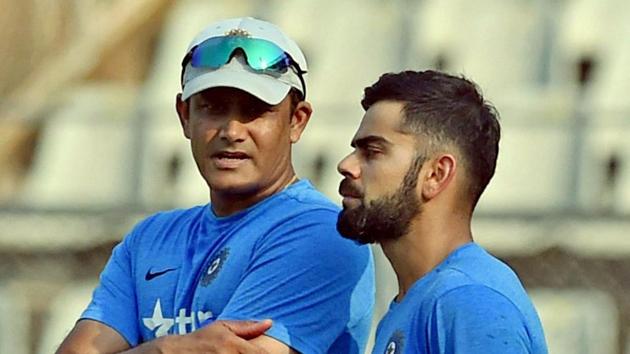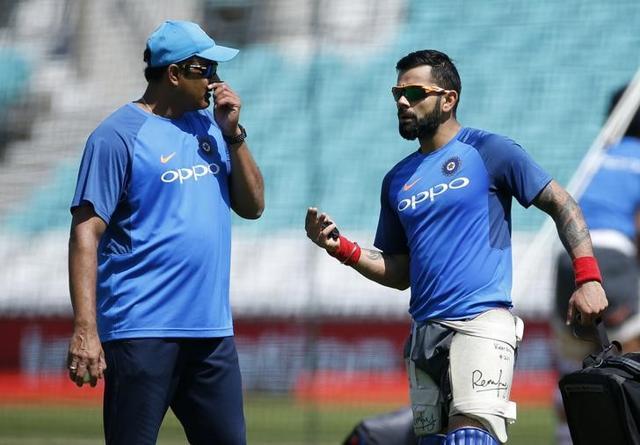Anil Kumble exit no surprise, only skipper can run an international team
Former spinner Anil Kumble parted ways with the Indian cricket team after Virat Kohli raised objections about his style with the Board of Control for Cricket in India.
Pakistan soundly beat India in the ICC Champions Trophy final and it’s been interesting, to say the least, to witness the aftermath.

Firstly, the Indian coach Anil Kumble resigned. Then the Pakistan players - not surprisingly - were welcomed home as heroes. This was followed by an ICC announcement that Afghanistan and Ireland have been added to the list of Test playing nations, increasing the number to 12.
Kumble’s resignation was no great surprise as he’s a strong-minded individual and the deteriorating relationship between him and captain Virat Kohli had reached the stage of being a distraction. Kumble’s character is relevant to any discussion about India’s future coaching appointments.
READ | India vs West Indies: Poor timing robs Caribbean series of sunshine
The captain is the only person who can run an International cricket team properly because so much of the job involves on-field decision making. Also, a good part of the leadership role –performed off the field – has to be handled by the captain, as it helps him earn the players’ respect, which is crucial to a skipper’s success.
Consequently a captain has to be a strong-minded individual and decisive in his thought process. To put someone of a similar mindset in a position where he’s advising the captain is inviting confrontation.
The captain’s best advisors are his vice-captain, a clear thinking wicketkeeper and one or two senior players. They are out on the field and can best judge the mood of the game and what advice should be offered to the captain and at the appropriate time.
The best off-field assistance for a captain is a good managerial type. Someone who can attend to duties that are not necessarily related to winning or losing matches but done efficiently can contribute to the success of the team.
Being own man
The last thing a captain needs is to come off the field and have someone second guess his decisions. He also doesn’t need a strong-minded individual (outside his advisory group) getting too involved in the pre-match tactical planning. Too often I see captaincy that appears to be the result of the previous evening’s planning, and despite ample evidence it’s hindering the team’s chances of victory, it remains the plan throughout the next day.
READ | India practice indoors as rain looms large ahead of second ODI vs. West Indies
This is generally a sure sign that the captain is following someone else’s plan and that he is the wrong man for the job.
India is fortunate to have two capable leaders in Kohli and the man who stood in for him during the Test series with Australia, Ajinkya Rahane.
It’s Kohli’s job as captain to concentrate on things that help win cricket matches and his off-field assistants’ task is to ensure he’s not distracted in trying to achieve victory.

India’s opponents in the final, Pakistan, were unusually free of any controversies during the tournament. They were capably led by Sarfraz Ahmed who appeared to become more and more his own man as the tournament progressed.
Pakistan cricket
Watching Pakistan’s success unfold from Islamabad, it was obvious how much the team’s success meant to the fans. While the ICC deliberated on increasing the number of Test playing nations, it’s good to see some consideration was given to Pakistan’s plight; not playing matches at home.
READ | ICC Women’s World Cup: All-round India beat England by 35 runs
It was the right time for the ICC to implement a plan to resume matches in Pakistan and to commence with small steps. In light of the recent instability around the world, it was reasonable to ask: “Is Pakistan the only region that is unsafe for hosting cricket matches?”
On the evidence I saw, and from what I was told by people in a position to know the situation, Pakistan’s security is much improved from the recent past.
READ | ICC in global sports event twitter first for Women’s World Cup
Adding Afghanistan (a more dangerous country than Pakistan) and Ireland to the roster does seem a little premature. The last thing Test cricket needs is more uncompetitive matches. Surely, the priority is to ensure Pakistan and West Indies, two great contributors to the rich history of the game, are both playing Test cricket to their full potential before expanding the number of teams.
Ian Chappell, former Australia cricket team Test captain, writes for Hindustan Times exclusively





